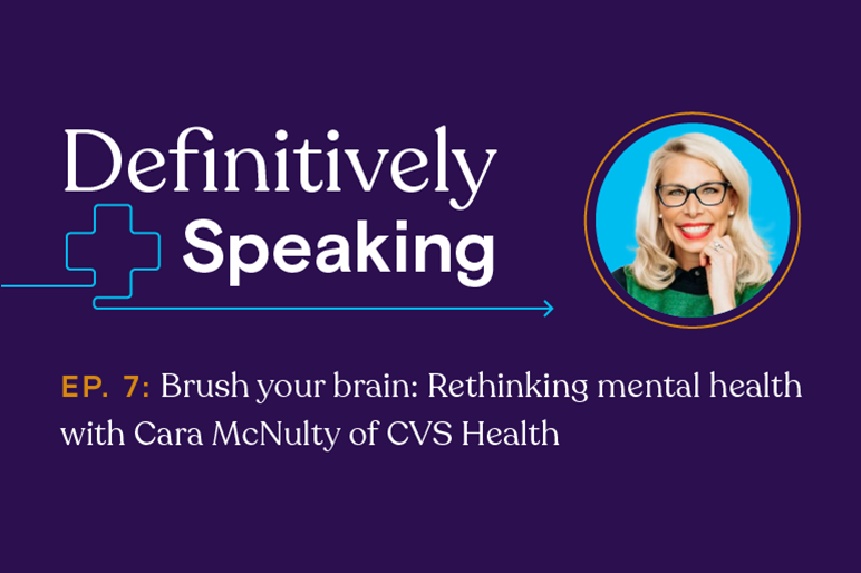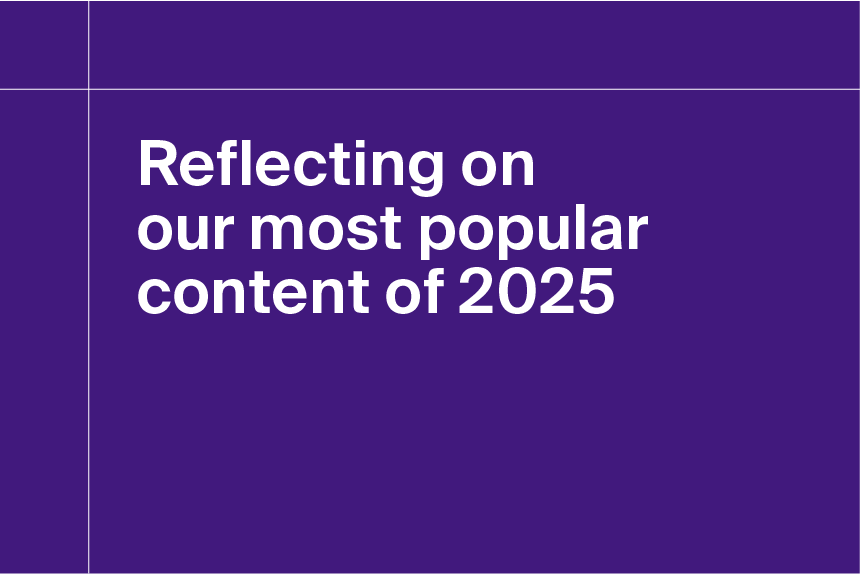Why you should brush your brain—and other takeaways from Definitively Speaking Episode 7
Jun 4th, 2022

Have you been getting enough sleep lately? I know I haven’t.
Between rising COVID-19 infection rates, medical staffing shortages with no signs of relief, and the daily deluge of other crises and tragedies dominating the news cycle, it’s been hard to shut down my anxious brain at the end of the day.
So my recent insomnia was top of mind—and particularly relevant—when I listened to the latest episode of Definitively Speaking, “Brush Your Brain: Rethinking mental health with Cara McNulty of CVS Health."
In a podcast recorded in recognition of Mental Health Awareness Month, Cara McNulty, president of behavioral health and Resources for Living at CVS Health, talks with Justin Steinman, our chief marketing officer, and Brittany Morin-Mezzadri, solutions engineer, about why mental health deserves the same attention as our physical wellbeing and how mental self-care doesn’t require a monumental restructuring of your daily habits.
Their conversation was compelling enough to shake off some of my sleepiness and hopeful enough to refresh my perspective on the future of mental healthcare in this country.
Keep reading for my top takeaways from this timely discussion.
Mental health is just as important as—and inseparable from—physical health
Straight away, Cara dispels an old myth: “Mental health” isn’t a distinct set of psychiatric conditions and diagnoses; it’s connected to every aspect of a person’s wellbeing, including their physical health, socioeconomic status, career and lifestyle. The way your body feels, the balance between your personal and professional responsibilities, your ability to financially provide for yourself and your loved ones—all of these factors have an effect on your mental health.
Later in the episode, Justin points out that the average delay from the onset of mental health symptoms to seeking treatment is 11 years. Let that sink in, and consider what such a delay would mean for any other health concern. As Justin puts it, “I wouldn’t live with a twisted ankle for 11 years!”
There’s no doubt that discussing and seeking care for mental health is less taboo today than it was just a couple of decades ago, but Cara still sees unnecessary shame surrounding the conversation. Some of this stigma is likely driven by a healthcare system that silos off mental health services as separate from the "routine" concerns met by general practitioners and family medicine physicians.
So what’s the fix? Cara suggests a system that puts mental healthcare up-front in the care continuum, making it more engaging and interactive for all patients—and she highlights how CVS Health is working toward that goal with a “head-first” approach to care.
The work doesn’t only fall on providers and institutions, of course. All of us, she says, have a responsibility to talk about our personal mental health in a less judgmental, more candid light and embrace the small acts of self-kindness that help us build resiliency.
In these challenging and unpredictable times, a little resiliency goes a long way.
The pandemic has made self-care harder, but even more necessary
Justin highlights the severity of the current situation with a statistic from a recent study conducted by Aetna: In October 2021, 44% of Americans reported experiencing a negative impact on their mental health—a figure that’s 10 points higher than what respondents reported in April 2020, and still likely underreported.
The COVID-19 pandemic has not only added a whole heap of new stressors to everyone’s plate, but also made it more difficult to perform the self-care that keeps us feeling good in body, mind and spirit.
Brittany points out there are environmental and cultural factors to consider, too: Depending on where you live and your level of risk, it may be harder to get outside, spend time with loved ones or access nutritious food. Members of minority communities, economically disadvantaged people and LGBTQ+ youth face unique barriers to care access, among other challenges.
For those working in healthcare, assisted living or education, for instance, the pandemic creates additional pressures. Growing rates of professional burnout could have society-spanning impacts that make conditions tougher for all of us. (Remember when I asked how you were sleeping? It turns out that insomnia is strongly associated with burnout—so take care of yourself!)
Cara also had a really interesting insight about our reaction to periods of severe stress – that in these moments, some of our most “normal” reactions are also some of the least helpful: hyper-fixating on a problem, putting others’ perceived needs before your own, or self-medicating with drugs or alcohol.
In many cases, these are the times when we can benefit most from slowing down, taking a breath and making some small-but-mighty changes to our routines.
It’s helpful to “brush your brain”—and not much harder than brushing your teeth
Cara believes that most people don’t need a brand-new Zen mindset to boost their mental health and wellbeing.
Instead, she suggests building mental resiliency through daily routines, just as you probably already maintain your physical health through daily routines: brushing your teeth, bathing, exercising and getting enough sleep. In other words, you should “brush your brain!”
Because our bodies don’t differentiate between mental and physical health, if your routine currently involves self-care, exercise and good sleep habits, you’ve already built a sturdy foundation for resiliency. You can go further with a nutritious diet, activities that bring you joy and spending time with people who matter to you.
With these habits in place, disruptions to your routine can also clue you in to when you may need some extra help. Feeling a loss in appetite? Finding it difficult to get up for your morning workout? It could be time to talk to a therapist or licensed clinical social worker—Cara shared that CVS has begun staffing certain locations with these mental health professionals, and early results are promising. Not only is CVS normalizing mental healthcare by placing these professionals front and center in their care model, but they’re also providing access to mental services in communities that typically lack them.
Cara closes with a simple request: Find the courage to reach out to someone, ask how they’re doing (how they’re really doing) and show each other that mental health is more than a personal issue; it’s a community effort.
As you can tell, this episode resonated with me. I really enjoyed the way Cara frames mental health holistically, as an interconnected aspect of our overall wellbeing. And I appreciated that the conversation lays out how simple it can be to make meaningful improvements to your own mental health, while acknowledging that members of certain communities or economic situations face undue stressors and disproportionate barriers to care in their day-to-day lives.
Mental health is an evergreen and evolving topic in healthcare, so stay tuned to Definitively Speaking for more perspectives on this crucial issue.
Learn more
Every episode of Definitively Speaking leaves me with interesting ideas to chew on, but this one hit especially close to home. I have a feeling a lot of readers will feel the same way.
If you haven’t already, be sure to subscribe and listen to Definitively Speaking every other week on your favorite audio streaming service, or here at definitivehc.com.
Want to dig into the data and analytics that informed this episode? Schedule a free trial today and see how healthcare commercial intelligence can help you find answers to your organization’s most pressing questions.



